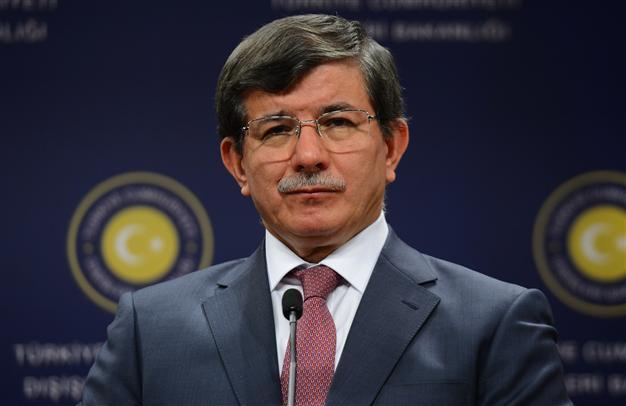Turkey’s FM implies espionage from within ministry over Syria leak
ANKARA

Ahmet Davutoğlu went ballistic after the leak, saying that everyone potentially implicated would be investigated. AA photo
The leak of a recording of top security officials discussing possible military action in Syria to the video-sharing website YouTube is a violation of confidentiality of the State of the Republic of Turkey, thus no one and no institution will be immune from being investigated over the incident, Turkey’s Foreign Minister Ahmet Davutoğlu has said.“Everything and everybody is being investigated in the most meticulous way,” Davutoğlu said in an interview aired live on NTV news channel on March 28.
In response to a question urging him to elaborate, the minister said “everything” included an internal probe at his ministry too, while underlining the incident constituted a case of cyber-attack against the confidentiality of the state.
“There were ordinary pawns used in this tapping. Fellow staff members have been assessing alternatives which may be related to this tapping technology,” Davutoğlu first of all said, when boldly asked to name the perpetrators of the tapping and was reminded of the fact he earlier said, “They have been using the ‘parallel structure’ inside [the state].”
Davutoğlu’s remarks, since he used the term “parallel structure,” signals that the ongoing hostility between the ruling Justice and Development Party (AKP) and the movement of Islamic scholar Fethullah Gülen is likely to reach a new high with the latest leak.
The term “parallel state” or “parallel structure” is commonly used by critics to refer to the Gülen movement. Gülen has been in voluntary exile in the United States for over a decade. The alleged “parallel state” is accused by Prime Minister Recep Tayyip Erdoğan of orchestrating a corruption scandal to unseat him. The related investigation went public in mid-December 2013 and triggered a huge counter-reaction from the AKP, particularly in the judiciary, as it aimed to contain the damage from the probe, which involved the sons of three former ministers and businesspeople known to be close to the government.
“It is a room where a jammer is used,” Davutoğlu said, referring to a device system used as a measure against being tapped.
“Whichever hands that used these pawns; there is no difference between launching an attack via violating the border or tapping confidential meetings of the state. This is an open attack. Any other violation committed in a different way may remain local, such as violation [of the border] by a plane. However, if such a cyber-attack is launched at a meeting where military and security options were discussed, then it is no different than a military attack.”
Upon such an interpretation, Davutoğlu was asked whether the response would be “militaristic.”
“I’m just saying in regards to the content. Otherwise, Turkey is a state governed by the rule of law and [the response] would be given within these rules. First, the pawns; and then whoever is behind these pawns, them,” Davutoğlu said.
Deputy PM dismisses MİT role
Deputy Prime Minister Bülent Arınç has dismissed any possibility that the MİT could be involved with the leak. “Thinking that the MİT could have leaked it is inconceivable,” he said, describing the incident as “treason to the state.”
“This is an extremely complex situation. It would even be beyond [Turkish officials'] intelligence. If this is done by a [foreign service] without a spy inside, the technology used needs to be well-assessed,” Arınç said.
Meanwhile, a Nationalist Movement Party (MHP) deputy accused one of the four officials attending the meeting of being a spy.
“The government constantly accuses [the Gülen] movement, calling them a parallel organization. But it is clear that there are other parallel organizations within the government. They are the ones who recorded the meeting,” Lütfü Türkkan told daily Hürriyet.
















